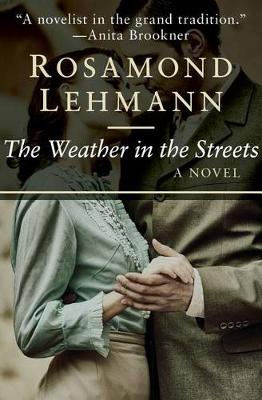Reviewed by brokentune on
Anyway, the lovely cover made me ignore the blurb. This is not usually a bad thng because I do prefer to read books without knowing much about them. This also helps to avoid spoilers and to me even a plot summary can be a spoiler. Yes, I really do love to know very little about a book when I pick it up.
Interestingly, had I read the description, I would have learned that this is the sequel to another book, which I haven’t read: Invitation to the Waltz.
I didn’t know it was a sequel, but it is likely that I would have been less interested in the first book anyway as it is a coming of age story and those tend to not work for me.
The Weather in the Streets starts with a woman, Olivia, meeting an old acquaintance (Rollo) on a train. There is something very Noel Coward to the story, and I don’t just mean Still Life (Coward’s 1936 one-act play that was the basis of the classic film Brief Encounters). The dialogue and observations are very witty, or rather, sharp.
‘I’m afraid I’m not very grown-up,’ he said suddenly.
‘Nor am I.’
‘I should have said you were.’
‘Oh, no!’ There was a pause; and she added nervously: ‘I’ve noticed people with children don’t generally mind so much … about age, I mean. They seem to feel less anxious about time.’
‘Do they? I suppose they do,’ he said. ‘I expect it’s a good thing to have children.’
‘You haven’t got any?’
‘No,’ he said. ‘Have you?’
‘No.’
They made it a joke, and laughed … All the same, it was surprising he hadn’t produced an heir. Couldn’t, wouldn’t Nicola? … or what?
‘Then,’ she said, ‘there are the pleasures of the intellect. They’re said to be lasting. We must cultivate our intellects.’
‘Too late,’ he said. ‘One ought to make at least a beginning in youth, and I omitted to do so. The fact is, I don’t care much about the intellect. I’m afraid the scope of my pleasures is rather limited.’
‘Really?’
‘Confined in fact entirely to those of the senses.’
‘Oh, I see …’ She answered his odd comically inquiring look with a lift of the eyebrows. ‘Well, I suppose they’re all right. Only they’re apt to pall.’
‘Oh, are they?’
‘I was thinking of cake.’ She sighed. ‘It used to be my passion – especially chocolate, or any kind of large spicy bun. Now, it’s beginning to mean less … much less.’
He leaned back, laughing; the tension dissolved again.
This is not a comedy, tho. There is something tragic about both Olivia and Rollo.
Interestingly, The Weather on the Streets was also published in 1936 (same as Coward’s Still Life), and in a way Lehmann’s story picks up on similar themes. However, Olivia’s and Rollo’s stories take quite different turns.
I loved this book.
One of the reasons why was that this another example of 1930s literature showing us how modern some attitudes in the interwar period were and that there were people who dared to step out of the life that other people want for them and make their own choices, fully knowing the cost at which this decision may come.
Now, it would be delusional to think that the stories depicted by Lehmann were common or even widely accepted. They were not. And I am not coming away from this book with the conviction that there was a regression after the war in attitudes as to what was “socially acceptable” (even tho I do wonder about this).
However, Lehmann’s book does give visibility to characters who struggle with their lot in life and decide to seek more for themselves, while trying to not damage or hurt the people around them.
And Lehmann’s writing is just wonderful.
There is one particular scene where Olivia feels sick on a train. It’s only a single paragraph, and yet it is enough to let us know so, so much about what is going on with both the plot and the character.
This was just so very good. I love the way that Lehmann writes about even serious things and yet still keeps a light tone.
I am very keen to find out whether Lehmann’s other works are equally satisfying.
This review was first posted on my blog.
https://brokentuneblog.com/2020/07/26/rosamond-lehmann-the-weather-in-the-streets/
Reading updates
- Started reading
- 6 July, 2020: Finished reading
- 6 July, 2020: Reviewed
